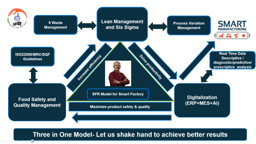Technical Manager and Digital Technology

In today’s data-driven food industry, being a competent Head of Technical or Technical Manager requires more than just deep knowledge of food safety, HACCP, or quality systems. It demands a clear understanding of digitalisation and how it transforms the entire supply chain — from procurement and production to traceability, compliance, and customer satisfaction. Regulatory bodies and customers alike now expect real-time data, transparency, and proof of control — not just paperwork. Meanwhile, competitors are investing in smart factory tools, such as MES, IoT, and AI, to enhance efficiency, traceability, and decision-making speed.
Technical leaders who fail to adapt risk falling behind. Digital fluency enables not only better compliance and risk management but also delivers insights that improve yield, reduce waste, and boost operational performance. This is no longer a future goal — it’s a present-day expectation. If we want to lead rather than follow, we must evolve our mindset and skill set now.


Please sign in or register for FREE
If you are a registered user on The FSQ Network, please sign in
I couldn't agree more that the role of a Technical leader in a F&B business is so much more complex than it was even 5 years ago...with the advancement of technology solutions to enhance critical controls through to the digitalisation of systems they are now required to work in an environment that is not just about setting the right procedures, but understanding how best to utilise and leverage these technologies to gain a deeper understanding of where to target improvements. In this environment it is imperative for them to have the right teams - both internal and external partners - to support critical thinking and maximise the value to safe food production.
"Agree with you — thank you for reinforcing this! You've made an important point about the role of internal and external teams. Technical leaders can’t deliver digital transformation in isolation; they need cross-functional support and trusted technology partners to truly drive improvement. The shift isn’t just technical — it’s cultural and strategic. Enabling critical thinking within the teams and fostering a mindset of continuous improvement is just as important as the systems themselves."